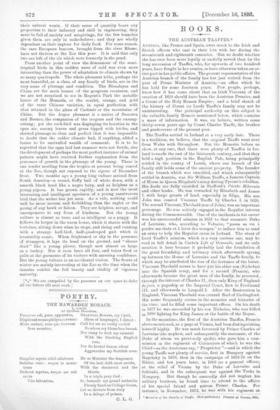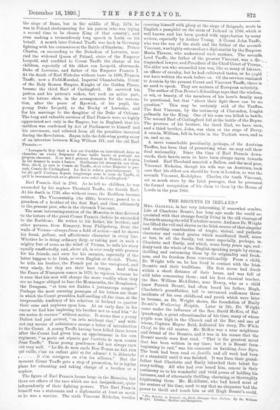BOOKS.
THE AUSTRIAN TAAFFES.* Ausraia., like France and Spain, owes much to the Irish and Scotch officers who cast in their lots with her during the- seventeenth and eighteenth centuries. •Bat we doubt whether she has ever been more loyally or usefully served than by the long succession of Taaffes, who, for upwards of two hundred years, have fought in her armies, or have otherwise taken an ac- tive part in her public affairs. The present representative of the Austrian branch of the family has but just retired from the post of Prime Minister of Austria,—an office which he has held for some fourteen years. Few people, perhaps, know how it has come about that an Irish Viscount of the creation of 1628 should have been the Austrian Premier, and. a Count of the Holy Roman Empire ; and a brief sketch of the history of Count (or Lord) Taaffe's family may not be uninteresting. Our principal authority on this subject is. the valuable family Memoir mentioned below, which contains a mass of information. It was, we believe, written some thirty-seven years ago by Count Charles Taaffe, the brother and predecessor of the present peer.
The Taaffes settled in Ireland at a very early date. There is a tradition, we believe, that the original Taaffe went over from Wales with Strongbow. But the Memoirs before us. show, at any rate, that there were plenty of Taaffes in Ire- land towards the end of the thirteenth century, and that they held a high position in the English Pale, being principally settled in the county of Louth, where one branch of the family still holds some of the ancient property. The founder of the branch which was ennobled, and which subsequently% settled in Austria, was Sir William Taaffe, a famous Captain.. of Horse in Queen Elizabeth's army during Tyrone's rebellion. His deeds are fully recorded in Stafford's Pacata Ribernia and other books. He was rewarded by Elizabeth and James 1. with large grants of land, especially in Sligo. His son John was created Viscount Taaffe by Charles I. in 1628. The second Viscount, Theobald (son of John), was an important personage. He was actively engaged in the Royalist interest during the Commonwealth. One of the incidents in his career was his unsuccessful mission in 1651 to that eccentric Duke of Lorraine, who, according to Voltaire, "passa sa vie k perdre sea etats et it lever des troupes," to induce him to send. an army to help the Royalist cause in Ireland. The story of. Lord Taaffe's mission, which is a very curious one, may be. read in full detail in Carte's Life of Ormonde, and we only mention it here because it probably laid the foundation of the great friendship and intimacy -which afterwards sprang, up between the House of Lorraine and the Taaffe family, to which may be attributed the rise of the fortunes of the latter. Viscount Theobald seems to have put his elder son (Nicholas). into the Spanish army, and for a second (Francis), who afterwards became the great man of the family, he procured,. through tbe interest of Charles II., then only King of England. de jare, a pageship at the Imperial Court, first to Ferdinand III. and afterwards to Leopold I. After the Restoration in England, Viscount Theobald was created Earl of Carlingford. His name frequently occurs in the memoirs and histories of the time, and he filled some important offices. On his death- in 1677 he was succeeded by his son Nicholas, who was killed: in 1690 fighting for King James at the battle of the Boyne.
In the meantime, the first of the Austrian Taaffes, Francis. above-mentioned, as a page at Vienna, had been distinguishing- himself highly. He was much favoured by Prince Charles of' Lorraine (the nephew, and subsequently the successor, of the, Duke of whom we previously spoke), who gave him a com- mission in the regiment of Cuirassiers of which he was the Chief—as the Austrians say, "Proprietor "—and in which the young Taaffe saw plenty of service, first in Hungary against Ragotsky in 1670, then in the campaign of 1673-76 on the Rhine, and ten years later, in 1683 (as a general officer), at the relief of Vienna by the Duke of Lorraine and Sobieski, and in the subsequent war against the Turks in, Hungary. But though he assuredly did not neglect his. military business, he found time to attend to the affairs of his special friend and patron Prince Charles. For instance, in November, 1673, he was with his regiment at.
Mohoirs of the ramilli of Taaffe. iNot published.) Printed at Vienna, 18513: 'the siege of Bonn, but in the middle of May, 1674, he was in Poland electioneering for his patron (who was trying a second time to be chosen King of that country), and even making a tremendously long speech in Latin on his behalf. A month later Colonel Taaffe was back in Germany fighting with his cuirassiers at the Battle of Sinaheim. Prince Charles, on succeeding to the Dukedom of Lorraine, mar- ried the widowed Queen of Poland, sister of the Emperor Leopold, and confided to Count Taaffe the charge of his children, especially of his eldest son Leopold, afterwards Duke et Lorraine, and father of the Emperor Francis I. At the death of Earl Nicholas without issue in 1690, Francis Taaffe, now a Field-Marshal, Imperial Chamberlain, Count of the Holy Roman Empire, Knight of the Golden Fleece, became the third Earl of Carlingford. He survived his patron and his 'patron's widow, hut took an active part, as his letters show, in the arrangements for the restora- tion, after the peace of Ryswick, of his pupil, be young Duke Leopold, to the Duchy of Lorraine, and tfor his marriage to the daughter of the Duke of Orleans. 'The long and valuable services of Earl Francis were so highly appreciated net only in the Empire, but in England, that his ,earldom was confirmed by Act of Parliament to himself and his successors, and relieved irem all the penalties ,incurred during the Revolution. Rapist tells the following pretty story of an interview between ,King William 11 1. and the old Earl Francis :— " LorsqueJle Roy 6tait a Loo on Gneldre en introdnisit dans an ehambre n vieux Seigneur d'une taille lactate et portant sea propres obeveux. II se skit t genoux devant Is Prince, et Is pria de lui deer la main bailees. Guillaume lila demanda son nom.
Sire, je suis le Combo Taaffe, et si volt-re Majesti5 is per- met, Count:elle Carlingferd. &e Roi le reieva gracieusement. 11 lui dit quail restima depais longtemps sous is now de Taaffe, et quills reeonnaltrait avec filaisir sous mini e Carlingford."
Earl Francis died in DO)4. As he left no children, he was succeeded by his nephew Theobald Taaffe, the fourth Earl. At his death in 1738, also without issue, the Earldom became extinct. The Tiscounhalaip (the fifth), however, passed to a grandson of a brother of the first Earl, and then ultimately to the,preeent peer, who,is the eleventh Viscount.
The moat interestingeection of the Memoirs is that devoted -to the letters of the great Count Francis (before be succeeded to the Earldom). He writes to his father, his brother, and other persons, from Hungary, from Philipsbnrg, from the walls of Vienna—always horn a field of action—and he shows his frank, gallant, and affectionate character in every line. 'Whether he is doing ordinary duty, or taking part in such a mighty feat of arms as the telief of Vienna, he tells his story • equally unaffectedly, and, above all, is ever ready with praises for his friends, and even for his enemies, especially if the -latter hisppen to be Irish, .or even English or Scotch. These, he tells his brother, the French put in the rear-guard, and "very wisely, for they are their best troops. And when the Peace of Nimeguen comes in 1678, he rejoices because he is sure thatiais men will nliarge the more readily when they are no longer obliged to face the Monmouths, the Douglasses, the Dungane, "et tons ore diables it justaucorps rouges." Perhaps the most amusing passages of his letters are those in which the Count grumbles, half-smiling all the time, at the irrepressible tendency of his relatives in Ireland to quarter their sons and nephews upon him. At an early date in his .career we find him imploring his brother not to send him " de .oes [Nees de recrues " without notice. It seems that a young Dalton had just arrived, "en tree mechant etat," and with- out any means of subsistence except a letter of introduction to the Count. A young Taaffe having been killed three hours after the Count had given him an appointment in his own regiment, " en perte est reparee par l'arrivee de mon cousin Jean Taaffe.." These young gentlemen did not always turn out very well. "La file de won wide Don Tomas ne fait rien qui vaille, eat un enfant gitte et fat adonné it la debauche ii s'en corrigera on e'en ira ailleurs." But the moment Count Taaffe gets a step of promotion, he is laying plans for educating and taking charge of a brother or a nephew.
The figure of Earl Francis looms large in the Memoirs, but there are others of the race which are not insignificant, quite independently of their fighting powers. This Earl Francis himself was a statesman and a diplomatist at least as much as he was a warrior. The sixth Viscount Nicholas, besides covering himself with glory at the siege of Belgrade, wrote in English a pamphlet on the state of Ireland in 1766, which IS well known and has been quoted with approbation by many writers, especially by Arthur Young. A Count John Taaffe, who was the son of the sixth and the father of the seventh Viscount, saws highly esteemed as a diplomatist by the Empress. Maria Theresa, who understood such matters. The seventik Lord Tatiffe, the father of the present Viscount, was a, tingaished lawyer, and President of the Chief Court of Vienna.,‘ His elder son who succeeded him was, like so many of hisrace, an officer of cavalry, but he had cultivated tastes, or he canld not have written the work before us. Of the serviced eendated to Austria by the present Count and Viscount Taaffe, there is no need to speak. They are matters of European notoriety,.
The author of Tom Brown's Schooldays says that the wisdom,. or wit, or beauty, of the members of his heres family may, be questioned, but that "about their fight there can be no. question." This may be certainly said of' the Tastes. The first Viscount, by the testimony of Clarondon, fought gallantly for the King. One of his Sons was killed in battle. The second Earl of Carlingford fell at the battle of the Boyne. The prowess of his brother, the third, Earl, we have seen., and a third brother, John, was slain at the siege of Derry. A cousin, William, fell in battle in the Turkish wars, and so on, and so on.
A more remarkable peculiarity,,perhaps, of the Austrians Taaffes, has been that of presevving. what. we may call their dual nationality. Since the time of Earl Francis down- wards, their hearts seem to have been always num towards Ireland. Earl Theobald married, a Bellew, and the neat peer, Viscount Nicholas, though his wife was an Austrian, took care that his eldest son shonld be born in London, as was the seventh Viscount, Rodolphus. Charles, the tenth Viscount,, set so much store by the Irish peerages, that he procured, the formal recognition of his claim to them by the House of Lords in the year 1860.











































 Previous page
Previous page